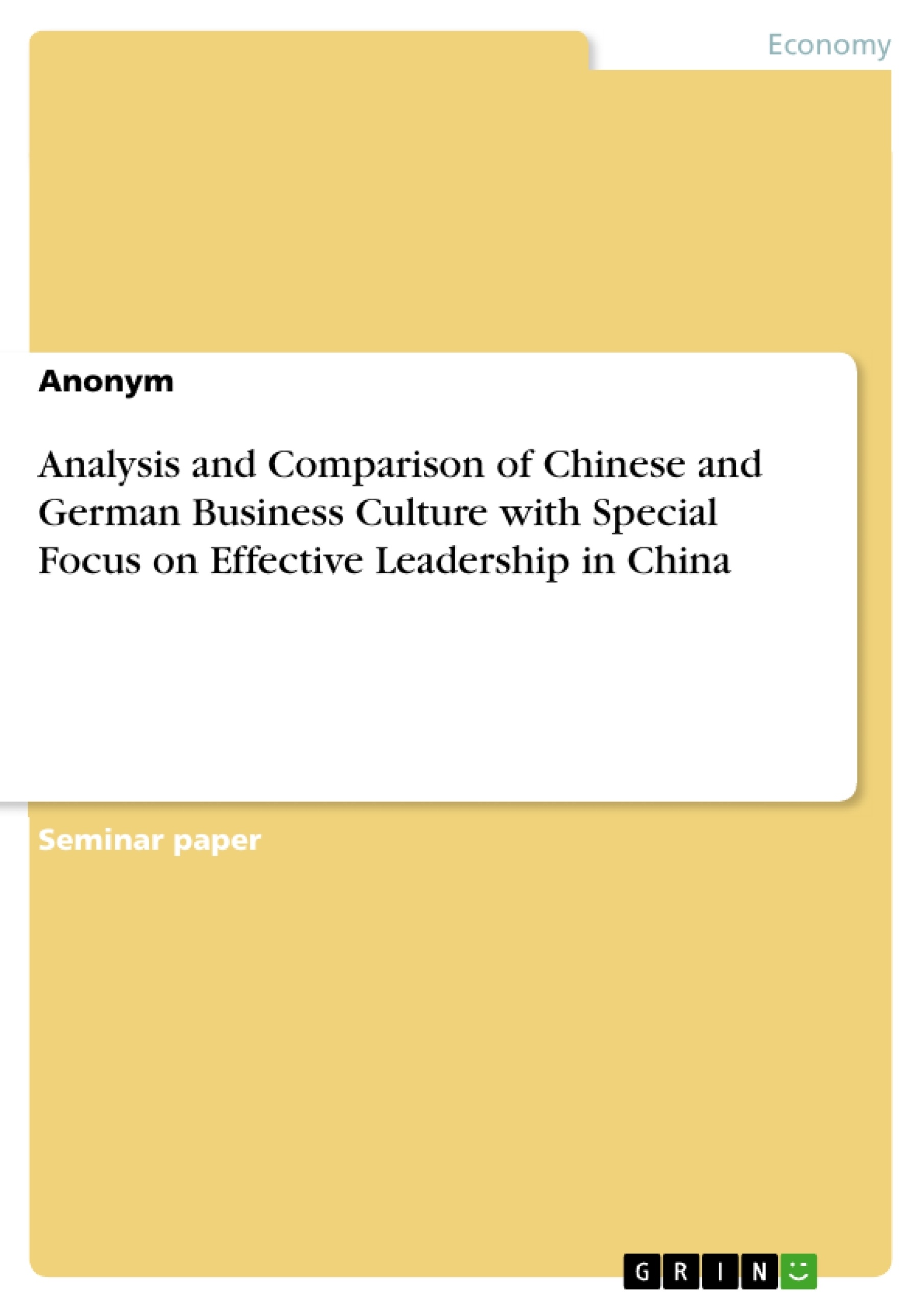Economic relations between China and Germany have a long historical tradition. However, during the last two decades trade has increased significantly. From a German point of view high potential growth opportunities and untapped market niches attracted companies to enter the Chinese market. Nevertheless, those entries did not occur without difficulties for business leaders and their workforce due to cultural differences and thus, diverging styles of doing business.
As a result, channelling knowledge of the two leadership cultures has become a relevant field to discover helpful aspects of interaction when managing Chinese operations or negotiations as well as cross-border mergers, acquisitions and alliances in China. Against this background, this paper aims for a description of both Chinese and German business culture with a specific focus on leadership in order to improve current understanding of effective leadership in China.
In this context, this paper builds on findings of the GLOBE study, which serves as the main scientific basis. First, it will be reasoned why GLOBE study establishes a reasonable fundament for the subject at hand. Second, German and Chinese business and leadership culture will be presented. Third, based on this description a comparison will be drawn in order to reveal applied learning potentials, which will be the fourth part of this paper preceding the conclusion.
Inhaltsverzeichnis (Table of Contents)
- Introduction
- Choice of Theory
- Analysis of German and Chinese Business and Leadership Culture
- German Leadership Culture
- Chinese Leadership Culture
- Comparison of German and Chinese Leadership Culture
- Recommendations for German Managers in China
- Conclusion
Zielsetzung und Themenschwerpunkte (Objectives and Key Themes)
This paper aims to provide a comprehensive analysis of Chinese and German business culture, with a specific focus on leadership, in order to improve the understanding of effective leadership in China. The paper draws upon findings from the GLOBE study, which serves as the primary research basis. The objectives are to:
- Explain the rationale for using the GLOBE study as a framework for analyzing leadership in different cultures.
- Present an overview of German and Chinese business and leadership culture.
- Compare the two cultures to identify potential learning opportunities for German managers in China.
- Provide practical recommendations for German managers working in China.
Zusammenfassung der Kapitel (Chapter Summaries)
The Introduction sets the stage for the paper by highlighting the growing economic relationship between China and Germany and the increasing need for cross-cultural understanding in business. The chapter emphasizes the significance of understanding leadership styles in both countries to navigate cultural differences and achieve success in cross-border ventures.
The Choice of Theory chapter justifies the use of the GLOBE study as the theoretical framework for the paper. The GLOBE study, with its focus on leadership in different cultural contexts, provides a strong research foundation for analyzing intercultural competencies. The chapter also discusses the relevance of the GLOBE study's findings in light of contemporary business trends.
The Analysis of German and Chinese Business and Leadership Culture chapter delves into the specific cultural values and leadership styles of both countries. It uses the GLOBE study's findings to highlight the unique characteristics of each culture and their implications for effective leadership.
Schlüsselwörter (Keywords)
The paper focuses on the key concepts of intercultural competencies, leadership styles, cross-cultural management, GLOBE study, German business culture, Chinese business culture, performance orientation, uncertainty avoidance, assertiveness, humane orientation, compassion, and interpersonal relationships. It examines these concepts in the context of effective leadership in a globalized business environment.
Frequently Asked Questions
What is the main focus of this business culture analysis?
The paper analyzes and compares Chinese and German business cultures with a specific emphasis on effective leadership styles in China.
What is the "GLOBE study" mentioned in the text?
The GLOBE (Global Leadership and Organizational Behavior Effectiveness) study serves as the primary scientific framework for comparing leadership across different cultural contexts.
Why do German managers often face difficulties in China?
Difficulties arise from cultural differences, such as diverging styles of doing business, performance orientation, and uncertainty avoidance, which impact leadership effectiveness.
What specific leadership traits are compared between Germany and China?
The comparison includes dimensions like assertiveness, humane orientation, compassion, and the importance of interpersonal relationships.
What are the recommendations for German managers in China?
The paper provides practical recommendations based on cultural learning potentials to help managers navigate negotiations and cross-border alliances successfully.
How has trade between China and Germany evolved recently?
Economic relations have a long tradition, but trade has increased significantly in the last two decades, driven by growth opportunities and market niches.
- Quote paper
- Anonym (Author), 2015, Analysis and Comparison of Chinese and German Business Culture with Special Focus on Effective Leadership in China, Munich, GRIN Verlag, https://www.grin.com/document/349764



